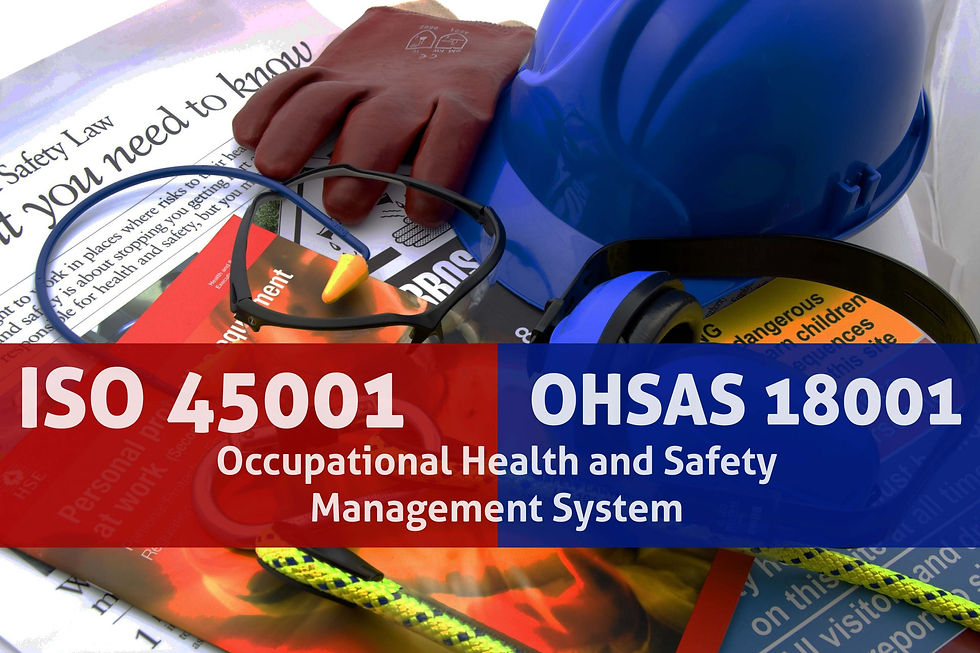Things You Should Consider to Become An ISO 45001 Lead Auditor
- Penelope Harriet
- Aug 4, 2023
- 3 min read
Updated: Aug 11, 2023

Becoming an ISO 45001 lead auditor is an excellent career choice for professionals in the field of health, safety and environment management. The ISO 45001 standard sets the guidelines for establishing, implementing, and maintaining an effective Occupational Health and Safety Management System (OH&SMS).
As organizations strive to ensure a safe and healthy work environment, the demand for ISO 45001 lead auditors has been on the rise. But, lots of people lack proper understanding of how they can become one. So, in this blog we are going to cover the important steps. By the end, you will have a clear idea of your first step.
Requirements to Become an ISO 45001 Lead Auditor
To become an ISO 45001 lead auditor, certain requirements need to be met:
i. Education and Qualifications
Generally, there are no specific educational requirements to become an ISO 45001 lead auditor. However, having a background in occupational health and safety, engineering, or related fields can be beneficial and provide a better understanding of the subject matter.
ii. Training Courses
Completion of ISO 45001 lead auditor training courses is mandatory. These courses provide in-depth knowledge of the standard, auditing techniques, and best practices.
Know that this can be a turning point in your career. If you choose a well known and industry’s recommended ISO 45001 Lead Auditor Course, you will gain important insights and knowledge of the work environment.
Developing Auditing Skills
To excel as an ISO 45001 lead auditor, it is important to develop strong auditing skills:
i. Familiarizing with Auditing Principles
Gain a thorough understanding of auditing principles, including planning, conducting, and reporting audit findings. This is important and can be developed if you enroll in a training program. Luckily, there are some institutes which are offering ISO 45001 in Pakistan. By joining their courses you will have a comprehensive idea of Auditing principles.
ii. Gaining Practical Auditing Experience
Seek opportunities to participate in internal audits or work alongside experienced auditors to gain practical experience. You can Volunteer for an Auditing Program of any organization, and help them in identifying potential hazards of their work environment. You can implement your learning points practically.
ii. Improving Communication Skills
Effective communication is crucial for an auditor. Enhance your communication skills to conduct interviews, present findings, and interact with employees at all levels.
iii. Develop a Critical Analytics Sense
If you can analyze a critical mindset to analyze the whole work environment, you will definitely thrive in the industry. This sense will help you in identifying the important vulnerabilities of the work station. Also, you will be able to provide a better assessment of the solution.
ISO 45001 Lead Auditor Certification Examination
To become a certified ISO 45001 lead auditor, you need to pass the certification examination:
i. Preparing for the Exam
Thoroughly review the ISO 45001 standard and study materials provided by the training institute.. Practice answering sample exam questions to familiarize yourself with the exam format.
ii. Exam Format and Content
The ISO 45001 lead auditor certification exam is typically a written examination covering various aspects of the standard, auditing techniques, and OHSMS implementation.
iii. Continuing Professional Development
As an ISO 45001 lead auditor, it is crucial to stay updated with the latest developments in the field:
iv. Staying Updated With ISO Standards
Regularly review updates to the ISO 45001 standard and other related standards to ensure compliance with current best practices.
You may also like: The Role of NEBOSH IGC in Improving Occupational Health
v. Participating in Industry Conferences and Workshops
Attend conferences, seminars, and workshops focused on occupational health and safety to broaden your knowledge and network with industry professionals.
Career Opportunities as an ISO 45001 Lead Auditor
Becoming an ISO 45001 lead auditor opens up various career opportunities:
i. Working as an Internal Auditor
Many organizations employ internal auditors to assess and improve their OH&SMS. This role involves conducting internal audits, identifying non-conformities, and recommending corrective actions.
ii. Joining a Certification Body
Accredited certification bodies hire ISO 45001 lead auditors to conduct third-party audits and provide certification services to organizations seeking ISO 45001 certification.
Conclusion
Becoming an ISO 45001 lead auditor requires a combination of education, experience, and training. By meeting the necessary requirements, developing auditing skills, and staying updated with the latest industry standards, you can establish a successful career as an ISO 45001 lead auditor. With the increasing focus on workplace safety, this role plays a vital part in ensuring organizations maintain a safe and healthy work environment.



Comments